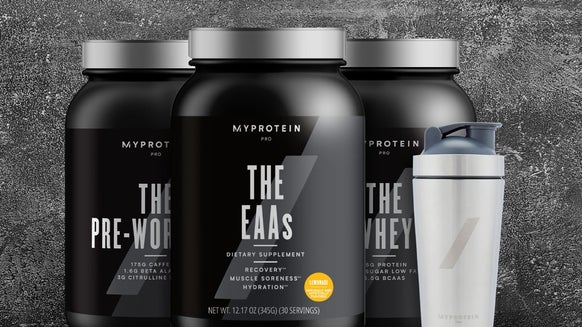5k Training Plan | Run with Myprotein

5K's are one of the most popular races out there. Running a 5K is a fairly achievable challenge that’s ideal for people who are just getting into running or who simply want to run longer distances.
Each of our 5k training programmes features 8 weeks of structured training, designed by British long-distance runner Jonny Mellor, to get you to 5k fitness as smoothly as possible, with optimal amounts of rest to facilitate recovery. If you’re not sure which of our plans best suits you, then try out one of the beginner-friendly plans and progress from there.
Beginners 5k Programme
5k is a great distance as it is the perfect introductory distance for novice runners, while also being a good test of speed for most advanced runners. 5k can also be a useful part of a larger training programme, making it ideal for those looking to develop speed before running a longer distance event.
The generic programme below combines a balance of speed, work, and mileage to improve anaerobic endurance and produce physiological adaptations vital for improving cardiovascular fitness. Remember, this is just a rough guide, so feel free to modify it to match your fitness levels– or for something more challenging try the intermediate plan.
The plan below includes low-intensity, steady-state running as well as a weekly long run. This is simply a slow run with the challenge of running a steady pace for the entire duration of the run, giving the body time to adapt to the stimulus of a long run, also allowing you to become familiar with appropriate recovery strategies following long runs. It will reward you with greater endurance adaptations that will serve you well in later sessions and races.
Towards the end of the programme, an introduction to interval training is included. Interval training involves alternating periods of high-intensity effort with periods of low-intensity effort, often called recovery. Interval training has many health benefits as well as improving your ability to run faster for longer. These efforts should be undertaken at a pace quicker than an easy run, but not an all-out sprint.
Week |
Tuesday |
Thursday |
Saturday |
Sunday |
| 1 | 2-Mile Easy Run | 2-Mile Easy Run | Rest | 3-Mile Long Run |
| 2 | 2-Mile Easy Run + 4x15sec Strides | 3-Mile Easy Run | Rest | 4-Mile Long Run |
| 3 | 3-Mile Steady Run + 4x15secs Strides | 3-Mile Easy Run | 2-Mile Easy Run | 4-Mile Long Run |
| 4 | 5MinsW/U – 5x1mins, 2min walk recovery, 5mins C/D | 4-Mile Easy Run | 2-Mile Easy Run | 5-Mile Long Run |
| 5 |
5MinsW/U – 3x2mins, 2min Brisk Walk Recovery 5mins C/D |
4-Mile Easy Run | 2-Mile Easy Run | 5-Mile Long Run |
| 6 |
5MinsW/U – 8x1mins, 1min Walk Recovery, 5mins C/D |
4-Mile Easy Run |
2-Mile Easy Run |
6-Mile Long Run |
| 7 | 5MinsW/U – 4x2mins, 1min Walk Recovery 5mins C/D | 4-Mile Easy Run | 2-Mile Easy Run | 4-Mile Long Run |
| 8 | 5MinsW/U – 8x1mins, 1min Walk Recovery, 5mins C/D | 2-Mile Easy Run | 5-K RACE |
2-Mile Easy Recovery Run |
Intermediate 5k Programme
The intermediate 5k programme below combines a balance of speed work and mileage to improve power and muscular endurance, which is an often-overlooked key factor for the 5k.
This plan introduces periodization into your schedule for the first time. This is to ensure you reach your peak at the right time while building suitable aerobic foundations on which to base your training. Hills training is scheduled in week 2 and is performed to improve leg strength, power, and develop your V02 max. They should be run at an easy pace for a warm-up, followed by a few gentle dynamic stretches and then running hard up the hill, with an easy jog back down, then recovery before starting again. For optimal results, run hills as a continuous effort.
Hill training then leads into interval training later in the plan. Interval training involves alternating periods of high-intensity effort with periods of low-intensity effort, often called recovery. Interval training has many health benefits, as well as improving your ability to run faster for longer. You should run at an easy run pace, but not an all-out sprint.
The intermediate plan also includes progression runs. These are a key part of the Kenyan training schedule. Start off slowly, at an easy run pace, and gradually build this pace in blocks of 10 minutes or by increasing the distance covered. Each section gets progressively quicker until you are running close to your 5k pace. Progression runs are the perfect development towards tempo running later in the programme. Tempo running is key for training improvements and should be run at a pace that is ‘comfortably hard’- faster than an easy run pace, but not as fast as your interval work.
| Week | Tuesday | Wednesday | Thursday | Saturday | Sunday |
| 1 | 3-mile easy run | 2mile easy recovery run | 3mile easy run | 3mile progression run | 5mile long run |
| 2 |
1milew/u – 4x2min hills, jog back recovery, 1min c/d |
3mile easy recovery run | 3mile easy run | 4mile progression run | 6mile long run |
| 3 |
1milew/u – 3x3min hills, jog back recovery, 1mile c/d |
3mile easy recovery run | 4mile steady run + 4x15sec strides | 5mile progression run | 7mile long run |
| 4 |
1milew/u – 4x3 hills, jog back recovery, 1mile c/d |
3mile easy recovery run | 4mile steady run + 4x15sec strides | 1mile w/u – 3mile tempo, 1mile c/d | 7mile long run |
| 5 |
1milew/u – 4x2: 30min, 2min jog recovery, 1mile c/d |
3mile easy recovery run | 5mile steady run + 4x15sec strides | 1mile w/u – 4x1 mile, 2min jog recovery, 1mile c/d | 8mile long run |
| 6 |
1milew/u – 4x3min, 90sec jog recovery, 1mile c/d |
3mile easy recovery run | 5mile steady run + 4x15sec strides | 1mile w/u – 3mile tempo, 1mile c/d | 8mile long run |
| 7 |
1milew/u – 4x3min: 30min, 90sec jog recovery, 1mile c/d |
3mile easy recovery run | 5mile steady run + 4x15sec strides | 1mile w/u – 4x1 mile, 2mins jog recovery, 1mile c/d | 6mile long run |
| 8 |
1milew/u – 8x1min, 1min jog recovery, 1mile c/d |
3mile easy recovery run | 2mile easy run | 5K RACE | 2mile easy recovery run |
Advanced 5k Programme
This programme incorporates long runs, short runs, hills, and intervals to develop your aerobic capacity, specifically for advanced runners. 2 days are afforded for rest and recovery, however, if you find that you are not recovering sufficiently from the training, then feel free to adjust your training accordingly.
| Week | Tuesday | Wednesday | Thursday | Saturday | Sunday |
| 1 | 1mile w/u – 4x3min hills, hog back recovery 1mile c/d | 4mile easy recovery run | 6mile steady run + 4x15 strides | 5mile progression run | 8mile long run |
| 2 | 1milew/u – 5x3min hills, jog back recovery, 1mile c/d | 4mile easy recovery run | 6mile steady run + 4x15 strides | 6mile progression run | 8mile long run |
| 3 | 1milew/u – 6x3min hills, jog back recovery, 1mile c/d | 4mile easy recovery run | 6mile steady run + 4x15 strides | 7mile progression run | 10mile long run |
| 4 |
1milew/u – 3x3 & 3x2min hills, jog back recovery, 1mile c/d |
4mile easy recovery run | 6mile steady run + 4x15 strides | 1mile w/u – 3mile tempo, 1mile c/d | 10mile long run |
| 5 |
1milew/u – 8x2: 30min, 90sec jog recovery, 1mile c/d |
4mile easy recovery run |
1mile w/u – 8x1min, 1min jog back recovery, 1mile c/d |
1mile w/u – 5x1mile, 2min jog recovery, 1mile c/d | 12mile long run |
| 6 |
1mile w/u – 6x3, 30min, 90sec jog back recovery, 1mile c/d |
4mile easy recovery run | 1mile w/u – 12x30min, 1min jog back recovery, 1mile c/d | 1mile w/u – 4mile tempo, 1mile c/d | 12mile long run |
| 7 | 1milew/u – 5x3min: 30min, 90sec jog back recovery, 1mile c/d | 4mile easy recovery run | 1mile w/u – 12x1min,1min jog back recovery, 1mile c/d | 1mile w/u – 4x1mile, 2min jog recovery, 1mile c/d | 8mile long run |
| 8 | 6mile steady run + 4x15 strides | 4mile easy recovery run | 3mile easy run | 5K RACE | 3mile easy recovery run |








